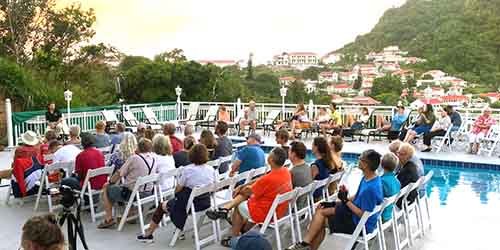Saba transforms into a living laboratory where world-renowned scientists work alongside curious locals and visitors to unlock the mysteries of nature.

Now in its 22nd year, the Sea & Learn Foundation’s annual program has become a unique intersection of rigorous science and community engagement. This month-long environmental awareness event proves that some of the most important scientific work happens not in sterile laboratories, but in the field—surrounded by coral reefs, tropical forests, and star-filled skies.
Scientists Without Borders
Fourteen experts from around the globe have descended on Saba this October, bringing expertise in marine biology, astronomy, botany, chemistry, and ecology. But unlike traditional academic conferences, these scientists aren’t just talking to each other—they’re opening their research to everyone.
Every other evening, the island’s community center fills with residents and tourists alike for multimedia presentations that make cutting-edge science accessible. This year’s topics range from coral restoration techniques and sargassum solutions to the chemistry of natural colors and the cosmic mysteries of dark energy.
“We’re connecting global science to local wonders,” explains the foundation’s approach. Topics span from the microscopic—like crustose coralline algae that help reefs survive climate change—to the cosmic, with astronomers revealing secrets of distant galaxies.
Hands-On Discovery
The real magic happens when presentations end and field work begins. Participants transform into citizen scientists, learning by doing rather than just observing. Visitors might find themselves setting insect traps in tropical forests, grafting mango trees, or diving to restore damaged sponges on coral reefs.
Other projects include measuring algae growth on protected versus grazed reefs, testing freshwater sources for toxins, and sampling the mysterious mix of pollen, spores, and particles floating in Caribbean air. Night activities range from star-gazing hikes with astronomers to identifying nocturnal bird species.
Each activity serves dual purposes: advancing legitimate scientific research while making complex concepts tangible for non-scientists. Data collected during these community projects contributes to peer-reviewed studies, proving that citizen science can produce rigorous results.
Education Across Generations
The program’s impact extends far beyond evening presentations. Scientists visit Saba’s schools daily, leading kindergarteners through forest fungi explorations and guiding high schoolers in marine biodiversity surveys. These hands-on experiences help young Sabans understand the value of their unique island environment.
The program also reaches Saba’s elderly residents through outreach at the local LIFE Center, ensuring that scientific discovery spans all generations. This multi-generational approach creates a community-wide culture of environmental stewardship and scientific curiosity.
A Model for Science Communication
Sea & Learn’s success offers lessons for science communication worldwide. By making research accessible, hands-on, and locally relevant, the program demonstrates how scientific literacy can flourish in unexpected places.
The initiative receives support from the Nature and Environment Policy Plan, Cultuurfonds Caribisch Gebied, Public Entity Saba, and numerous local sponsors. Remarkably, all public events remain free, removing barriers to participation.
After two decades of bringing science to Saba, the program has created something rare: a community where cutting-edge research and everyday life intersect naturally. In an era when scientific literacy faces challenges globally, this tiny Caribbean island offers a compelling model for engaging people with the natural world.
For visitors, Sea & Learn provides an opportunity to experience science tourism at its finest—where vacation activities contribute to meaningful research. For Sabans, it’s an annual reminder of their island’s global significance in understanding environmental challenges.
As climate change and biodiversity loss accelerate worldwide, programs like Sea & Learn become increasingly vital. They prove that scientific understanding doesn’t require advanced degrees—just curiosity and the chance to explore nature alongside experts who are passionate about sharing their knowledge.
The program continues through October, with new discoveries happening daily. For those unable to visit Saba, the model itself offers inspiration: science becomes most powerful when it leaves the laboratory and meets people where they are.
For more information about Sea & Learn on Saba, visit: https://www.seaandlearn.org/2025experts
Sea & Learn

 Saba News News and Information from Saba Island, Dutch Caribbean
Saba News News and Information from Saba Island, Dutch Caribbean
